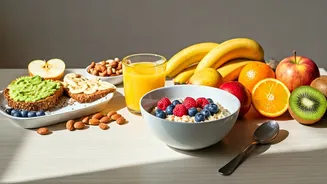Breakfast's Protective Role
The research emphasizes that a fiber-rich breakfast can play a significant role in maintaining a healthy digestive system, which in turn could potentially
lower the risk of colon cancer. This is achieved by promoting a healthy gut environment, regulating digestion, and decreasing inflammation related to gastrointestinal issues. While breakfast isn't a guaranteed cure, it’s a valuable piece of a more extensive strategy to avoid colon cancer. The protective effects of breakfast become more apparent when it's integrated into a long-term, healthy routine rather than a sporadic effort. People who maintain a healthy weight, engage in regular physical activity, and incorporate a lot of plant-based foods in their diets usually have a lower risk of colorectal disease. Consequently, breakfast serves as an additional layer of support for gut health, offering a balanced approach to overall vitality and well-being.
Fibre-Rich Foods
Starting your day with a nutritious breakfast filled with fiber-rich foods can be a game-changer. Consider incorporating whole grains, fruits, and probiotics into your morning meal. These ingredients are essential for maintaining a healthy digestive system and potentially lowering the risk of colon cancer. For example, oatmeal, whole-grain toast, or a smoothie packed with fruits and vegetables can be excellent choices. These options provide your body with the necessary fiber and nutrients, kickstarting your digestion and helping maintain a healthy gut microbiome. By making these small yet impactful changes, you are actively supporting your gut health and promoting overall well-being. The key is to make these choices a part of your daily routine for consistent and lasting benefits.
Avoiding Unhealthy Choices
While focusing on the positive aspects of breakfast is crucial, it's also important to be aware of foods that could potentially increase your risk of colon cancer. Processed meats, such as bacon and sausages, are often high in preservatives like nitrates and nitrites, which have been linked to an increased risk of colorectal cancer. It's recommended to limit or avoid these items as part of a healthy breakfast plan. Instead, opt for lean protein sources, whole grains, fruits, and vegetables to create a balanced and nutritious meal. By making informed choices, you can create a breakfast that supports your health and reduces potential risks. Always consult with a healthcare professional or registered dietician for personalized advice tailored to your individual needs.
Beyond Breakfast
While the focus is on breakfast, remember that colon cancer risk is also influenced by a wider range of lifestyle choices. This includes your overall diet, how much you exercise, your alcohol consumption, and whether you smoke. Additionally, your family history plays a role. Regular screening, especially after age 45, remains one of the most effective ways to identify early signs of colon cancer. This screening can significantly increase your chances of successful treatment if the disease is detected early. Combining a healthy breakfast routine with other preventive measures such as maintaining a healthy weight, regular exercise, and a balanced diet, can provide comprehensive support for your gut health and reduce your risk of colon cancer.
Consistency is Key
The positive effects of breakfast on colon health are best observed when it becomes a regular habit, rather than an occasional endeavor. Consistent, nutritious breakfasts help regulate digestion, support a healthy gut microbiome, and reduce inflammation, all of which contribute to a lower risk of colorectal cancer. Think of breakfast as one element within a broader health strategy. Making the commitment to eat a healthy breakfast consistently, alongside other healthy habits, such as regular exercise and a balanced diet, will provide the greatest benefit. This approach to health is a marathon, not a sprint, and consistency is crucial for reaping long-term advantages. The more you incorporate these healthy behaviors into your routine, the more significant their impact will become.














